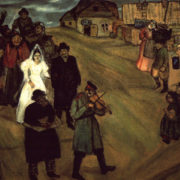
United States’ fabric is reaching a point of no return that resembles what happened less than 200 years ago with the Civil War. The reason for contention has changed, but its structure didn’t. The other side of the Nation is no longer a partner with whom political understandings may be negotiated but an enemy to fight against. Ultimately, this internal enemy should be subjected to an ideological monopoly set by the winner. For the second time in its short history, America feels that its sovereignty is endangered not from without but from the deep fabric within the Nation.
While during the Civil War, the great divide could be geographically framed (North vs. South), today, the battlefield has expanded and spread across American society. This great divide within the Nation has entered into school and educational issues, sports and universities, media and arts – and it affects the everyday life of each American citizen.
***
The two major parties have become the bare mirror of this great divide within American society – and this means the end of politics as an instrument to negotiate a common ground that holds together the Nation with its many social conflicts. And no one, either in society or in the parties, seems to fully realize that history has drawn a role beyond internal issues for the United States. A role that is much more decisive than every «cultural war» fought within the Nation. America can no longer be great alone, and it cannot be great declaring war on one part of its citizenry.
But these tones usher in a long campaign one year ahead of the presidential election in November 2024. Is there still time to reverse this course of events, with their nefarious outcomes on the world order?
Perhaps not, but let’s try an imagination exercise. First, the liberal culture of the Democratic Party should ask itself why the political and legal realization of its core values has generated such deep resentment in the other half of American citizens. It was the Democratic Party that brought about a “legalization” of values – dictating via laws its liberal values to the whole citizenry.
Without this work of self-critical reinterpretation, any Democratic politics would be felt as unreliable, if not downright subversive. On the other hand, the Republican Party has to decide whether to Europeanize itself permanently, becoming a party ad personam (Berlusconi came long before Trump), or whether to reared the US political particularism in an original way that could keep up with the challenges America is facing at home and abroad.
Without providing clarity on these two issues, both parties are set to become not-leading actors and multipliers of the great divide tearing apart the Nation’s fabric. Only politics can save the United States from being swallowed by the emotive underbelly of a divisive society unable to find common ground for civil coexistence.
***
Finally, there is an urgent need for clarity around two American constitutional myths. The first concerns the Constitution’s importance; the second concerns a Constitution without society.
Roe v. Wade (1973) represents the watershed of a political (ab)use of the Supreme Court’s constitutional power. This ruling exposed an inherent weakness in American constitutionalism: the Constitution, however one may legally interpret it, imposes itself over the Nation only through the Supreme Court justices, who have their hermeneutics and values.
The transition of political debate to a politics of values – that eventually led to the so-called «culture wars» – was an invention of the Democratic Party, and it has made possible the supremacy of the Supreme Court justices over the Constitution itself. Democrats should not be shocked if Republicans today do what they did 50 years ago.
The second myth: the people of the US Constitution are not society as a whole but the sum of individuals who can be said to be happy with a given internal order of affairs. The pursuit of happiness was initially conceived in terms of economic success – and one has only to stroll along the streets of New York, Cleveland, or Detroit to realize how much human waste the American people produce.
However, today, happiness is no longer sought only as an economic issue. Still, it has become a holistic feeling: the general implementation of personal values is decisive for the civic achievement of individual happiness. But this holistic range of values can be reached only through their legalization, and when values become laws, they are no more values.
***
US liberalism, tolerance, and its being a universal “melting pot” won World War 2, the Cold War, and advanced three decades of globalization. It has been a time of unprecedented progress, wealth, and relative peace.
Why should the USA want to abandon its successful formula today?
There is an identity crisis in America. Behind the rise of the woke culture and the specular opposition to it, there seems to be the end of the American hallmark since the early establishment of the colonies – the waning of the dominant WASP culture, being overcome by the growth of Latino, African-American, and Asian culture. The US culture was the offspring of a part of European culture; now, it is more of the world culture.
Still, these immigrants coming to the US or being forced to the US (like the children of the formerly enslaved people) left their original cultural cradle (willingly or not) and sought fortune in a new cultural environment, the WASP-shaped US. Then, dismissing and casting away the old US traditions it destroys the US and its unique fabric. Still ignoring the latest inputs rips the existing fabric, which can’t cover the present world. A new cultural fabric must be woven, saving all the US tradition’s main threads but also weaving in new threads.
People of Catholic religious cultural background, not Protestant, are becoming more relevant. Catholicism, once a fringe religion, the faith of the underdogs, is split. In part, it has become the belief of staunch traditions, and thus, it defends reactionary WASP sentiments – signing a strange alliance with the evangelicals. In part, it sides with the rising tide of new migrations challenging the present order.
It is not about one side replacing the other; it is about finding a new balance and cultural equilibrium.
***
The USA established, as a whole, a new world peace, Pax Americana, which can’t be easily dismissed.
The world is not flat, but the USA has a political position like no other country. It is not “unilateralism.” American exceptionalism guarantees multipolarity in Asia, home to 60% of the world’s population and about half of the global economic growth.
This part of the world was set to fall under Japanese imperialism; then, it risked being dominated by the USSR and assertive China. Every attempt to dominate the region sparked bloody wars and fierce resistance by the other countries. The American presence will guarantee that no country will try to dominate the region; thus, it can safeguard peace.
It is a profound internal and international transition. The US is no longer a nation but a way of being of the world.
Yet, part of the US is now seduced by the tyrannical ideas it fought and confronted for over a century. Such seduction contradicts the basic idea on which the American fabric has been established: “insuring domestic Tranquility and securing the Blessing of Liberty to ourselves and our Posterity”.






Comment by Prof. Reuven Brenner
Dear Francisco,
I agree with much in your piece, indeed “There is an identity crisis in America. “
Only I would put it stronger – there is an identity crisis in Western Europe too, and perhaps in many others places – less visible, less heard of.
I would say behind it is what I often wrote about – demography. We have almost 8 billion roaming the planet, up from 1 billion a century ago. And they are mobile – and also the tech mobility brings information to their palm.
It is much harder to retain customs, traditions in a world in which – you can disappear in the crowd, anonymity became so easy, and where you loose some of the roots, discipline stabler, smaller communities imposed in the not so distant past.
Yet, people also want ot belong a group – otherwise – what’s their identity? There is the old Talmudic saying: if I am not for myself, who will be for me? But if I am for myself only – what am I? But which one? Now you can suddenly “belong” to an echo chamber on the net, zooming, skyping , quickly organizing a mob for some causes (almost lynching included, see Dagestan). Many invoke “free speech” but forget that even the US law has many exceptions to it, one being “you cannot cry “fire” in crowded places. Yet social media has been doing so in a flash, and create ready to vandalize and lynch. Yet we live with atavistic institutions and interpretations.
You are also right that the US melting pot model is perhaps more at danger than others – some of its atavistic institutions and laws created for a world where – yes – people migrated (but far more slowly) – and there was NO welfare state. You swam or sank – and if you look at migration statistics of a century ago to the US, you’ll see that from Italy some 30-50% went back (and it is only males came first, if they swam then they paid for the family to come etc.)
Today as I put in some of my articles – demography and welfare society – can become a lethal combination. Not clear how many immigrants from, very different cultures you can absorb, and over what period of time. You have this problem in Europe too – but to less extent because most EU countries are more homogenous and have no melting pot principles. What requires far longer to explain, and I cannot do it in an email, is the strange preoccupation of the mass media with esoteric, marginal fluff about restrooms for transgenders (how many are there?), when what defined vast majorities of people, what linked them together – the model of their society – is falling apart, melting before the eyes. No borders, laws on the books but not respected, the masks of tolerance dissolving into thin air, respect for institutions – Supreme Court, Congress, Federal Reserve – gone. Let us not talk about presidents and political leaders.
So just briefly about one particular policy. My take is that many countries will have far stricter migration controls; will also adjust their entitlement policies – the much criticized Hungarians , Polish – will may actually be even used as examples. I asked my friends what country, capital is now the safest, most pleasant, no fear in Europe? They all said – Budapest! Poland next – but Warsaw bears no comparison to Budapest.
I briefly summarized the above here:
https://asiatimes.com/2023/11/melting-pot-multicultural-myths-fall-to-demography/
Although you will find far deeper treatment , both looking back into history and into possible solutions, in my “How to Relink 7 billion” (American Affairs). You can read there how some “isms” have been related to demographic changes – relink increasing number of people around a “national” idea, or what Marx (completely wrongly) thought that “workers would unite across borders and fight the – “bourgeoisie” , rather than unite around institutions that the U.S have been standing for – with hopes of social mobility. People have voted with their feet for the latter model of society – leaving behind one promising – on paper – equality of results (ending in misery and corruption – of the spirit too).
Now if you want to get more deeply into this, recall that the word “religion” comes from “religare” which means to relink – and that exactly reflects another idea around which people once untied more in the past than now. Although I would not be surprised if rediscovered and returned in some form and shape to this option, in their quest for belonging.